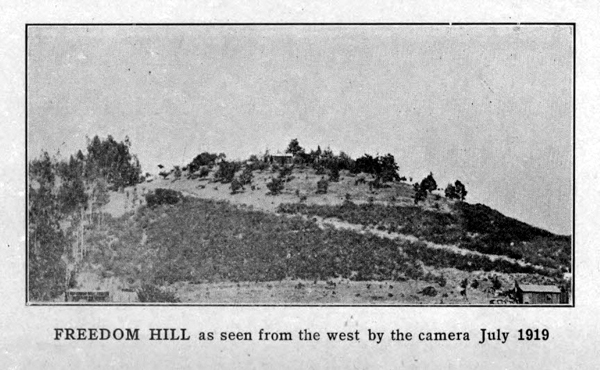
A Colony of Cranks: The Henry Family at Freedom Hill
By Wes Clark and Mike McDaniel
In October of 2015 Mike McDaniel came across a photo of a fellow named Harper B. Henry, a hermit/philosopher who lived in the Verdugo Hills above town. Subsequent research led to an interesting realization that there was once in Burbank/Sunland a philosophical hotbed of sorts at a place called Freedom Hill, and details emerged about the Henry family who resided there.
LEROY "FREEDOM HILL" HENRY (1860-1932)
Leroy Henry was married to Eora C. Beach, who was born in 1863 and who died in 1899. His career as a crank coincided with his status as a widower. According to a Los Angeles medical occupational register, Leroy Henry is listed as a graduate of the Medical College of Indiana, 1893 (he is often refered to as a medical doctor in articles).
Henry maintained a press at Freedom Hill, and printed a series of booklets about his philosophies and "brain ticklers." The publications were prefaced by comments like "PRICE TWENTY FIVE CENTS WHICH IS TOO MUCH IF YOU DON'T READ IT AND NOT ENOUGH IF YOU DO." Another example: "Dear Comrade: If you like this booklet, lend it to your poor friends and tell your rich friends to buy a copy. If you don't like it, keep quiet, and consult a specialist on mental diseases. I am an insane specialist and I can readily tell whether any one is just right in his mind. If you agree with my notions, then you are all right. If you don't agree with me, then I know you are crazier than I am." Henry gave the address of the press as "Freedom Hill Pressery, RFD A, Burbank, California."
But where was Freedom Hill in Burbank? It wasn't. According to researcher Barefoot Ted, it was in modern Sunland, in the Shadow Hills district about three miles northwest of the Burbank boundary line. The north end of what is now Helen Avenue seems to be the site. Burbank is mentioned often, however, as this area was served by the Burbank post office.
The following article explains some of what went on at Freedom Hill:
From the Los Angeles Times, September 9, 1917
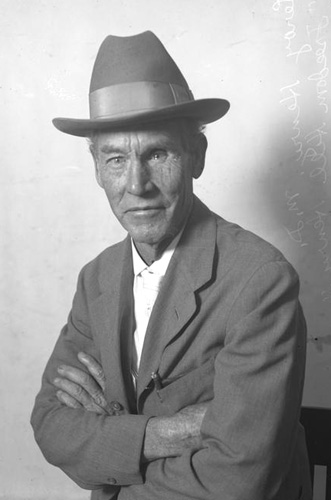 Freedom Hill was the home of a philosopher/pamphleteer named Leroy "Freedom Hill" Henry (shown at right c. 1927); it appears that it was also the center of a host of self-named "cranks," who gathered there to discuss life, happiness and philosophical issues starting in about 1913 and ending about 1930, when the family started to have financial difficulties.
Freedom Hill was the home of a philosopher/pamphleteer named Leroy "Freedom Hill" Henry (shown at right c. 1927); it appears that it was also the center of a host of self-named "cranks," who gathered there to discuss life, happiness and philosophical issues starting in about 1913 and ending about 1930, when the family started to have financial difficulties.
Colony of Care-free Mortals at Camp Fire.
Each Scorns Bed and Sleeps on Mother Earth.
"Relaxation and Forget All" is the Watchword.
Eighteen miles northwest of Los Angeles, near Roscoe, a colony of cranks has been enjoying the next to-nature life during the past week under the watchful eye of Dr. Leroy Henry, chief crank of the bunch.
The word "cranks" is not innapropriate because the folks themselves call themselves such and their present stunt is the "second annual campfire of California cranks."
Moreover, the colony had its rendezvous at Camp "Don't-Give-a-Durn" located at "Freedom Hill." Evidently the conventions are not observed to the letter and "have a good time" seems to be the mainspring of the outing.
The cranks have been enjoying the simple life for more than two weeks. They started their free-and-easy relief from city distractions on August 31, and, unless all signs fail, stakes will be pulled tonight. Two sessions daily have been held, one at 2 o'clock and the other at 7 o'clock, each lasting a full two hours. The speeches have been only ten minutes short of one hour in length and the rules of the camp forbade a discussion of the main topic. Incidentally there have been music and some recitations.
Each crank has his or her own blankets and food and such a thing as a bed is taboo. No, indeedy; old Mother Earth is good enough. Dr. Henry announced in the beginning that repose would be upon "garden beds softened with pick and rake," and it has been so. Dr. Henry, who gets his mail at Burbank, invited his friends to wear washable clothes "and for a few days to live the simple, relaxed life under the trees with the birds and stars and intellectual friends." He also told them: "Tone up your inner life and adjust the wheels in your head so your soul, if you have one, will have as good a chance to grow as your potatoes and bank account." Dr. Henry added that he was strong for "the deeper life."
Somebody yesterday said that the men wear Mother Hubbards at the camp and the women youth's short trousers, but that is another story.
More about the life at Freedom Hill can be gleaned from this passage found in one of Freedom Hill Henry's pamphlets:
By Guy Bogart
Utopia flourishes on Freedom Hill. Happiness has been found amid the eucalyptus groves and budding fruit trees planted and cared for by the hand of Dr. Leroy Henry. Spiritual heights and spiritual flights are the rule on Freedom Hill, situated in the hills by easy stage trip from Los Angeles. He has gone far in the pathway of realization and his little ranch is one of the important focusing points of Southern California spiritual life.
Dr. Henry is an M. D., with a thorough understanding of massage, osteopathy, chiropractic, psycho-therapy and other lines of mauling, coaxing and wheedling the human form divine into claiming a little more of its divinity.
Each summer Dr. Henry holds a clinic at his ranch, extracts gloom and fear from you free of charge, injects a mixture of sunshine and optimism during the day, and sends you to bed to gaze up into the twinkling eyes of the night after the sun dips behind the mountain ranges. Not, however, until after all have spent a few hours around a blazing campfire.
When letters pour into the abiding place the “Chief Crank” too fast, he just prints a little edition of “'THE CRANK, an eccentric Freedom Hill magazine for unusual people.”
During the mellowing years of usefulness Dr. Henry has learned to live his philosophy; to extract his idealism from the clouds and make it over into a suit of overalls to wear down here on earth. And, best of all, being Hoosier, he possesses the gift of the fairy pen that can translate thought into literature as well as into action.
Speaking of writing—as the months have grown into years, there has also grown a pile of manuscripts that Dr. Henry reads occasionally in his conventions and to select groups who happen to be fortunate enough to gather at his feet occasionally. Some of these essays and sketches he is now issuing in a series of two-bit doses of enlightenment.
The first, "Freedom Hill, the Place of Evergreen Happiness,” gives directions “how to be happy though miserable.” I know that this is one of the finest and most wholesome bits of philosophy you will find anywhere. I know his life and his philosophy in general and anything bearing the Freedom Hill Henry imprint has my endorsement “sight unseen.”
Others are: "Freedom From Fond Friends," tells how to vaccinate against them.
"Henry's Glass Eye Story," gives his experience with doctors, healing friends, and enjoying sickness.
"The Divinity of the Devil," guaranteed to cure devilishness. Will be ready June 1.
Among the booklets to follow as he can find time to print them are:
"Usefulness of Useless Husbands," which he claims will cure grass widows' sorrows.
"My Conceit Machine." Cures enlargement of self-esteem.
''Falling in Love Again and Again,” contains the germ of love sickness, and how not to cure it.
''Christian Science Soothing Syrup.”
"A Crazy Crank," claims to be an honest confession.
Some of Freedom Hill Henry's publications may be viewed online!
In addition to his booklets, Henry also published a quarterly magazine called the "Hooly-Kopsin," described as "...a miserable, divided quarterly devoted to the study of Happiness and Unity. It is written and printed on Freedom Hill, where the editor and publisher lives, moves and has his consciousness; also his pencil and press but no scissors."
While Freedom Hill Henry looked somewhat scary on account of his glass eye (suffered via a medical mishap), his writings portray a gentle, philosophical soul. Here are some notable examples of Freedom Hill Henry's writings, gleaned from his pamphlets:
His reputation...
"I used to have a good reputation back in Indiana. But when I came west I left it behind. It was too much trouble to move it around and pay freight on it. And if I should be so unfortunate as to acquire another gilt-edge reputation, I would lock it up in a bank vault for safe-keeping while I went out and had a good time doing just as I pleased."
Doubtful medical practice...
"Sometime when I am in the proper mood I am going to invent a new method of healing a method more foolish, if possible, than any method known at present. I am not sure that I am smart enough, or should I say, foolish enough, to do it. I would like to see a method tried that was more remote from reason, sense and science than any present system. Judging from the success of other systems I think my new system will become very popular; and also profitable to the undertaker."
On being a crank...
"The difficulty is that my friends do not understand that I am a peculiar crank. Nature has made an entirely different set of laws and regulations for me; just for me alone and not applicable to any of you. I am governed by a peculiar mystical system; a system that is invisible, intangible, undemonstratable, unprovable, and unbelievable. I am especially protected by the gods, so that no harm can come to me. Nothing ever happens to me but what I deserve. I never get stung unless I go too close to a wasp's nest. I never get sick unless I need to. Nobody is ever unjust to me. Nobody steals anything from me but what I can get along without. I never lose an eye that I have to have."
Happiness...
“My painful experience taught me that happiness does not consist in the number of eyes a man has, nor in the size of his bank account, nor in the number of friends he has. But happiness seems to consist in the state of his mind. To be happy we don't have to have two eyes nor five thousand dollars, nor seven faithful friends, nor even good health. To be always happy we need only to change our minds and get some of our crooked notions straightened out.”
Communication...
“At the present day there are said to be three methods of communicating thoughts. If a person has some thoughts that he wishes to disseminate far and wide and rapidly, he will either telephone, or telegraph or tell-a-woman.”
His glass eye...
“Before getting my glass eye, the two empty eyelids looked lean and hungry and lonesome. They looked like two hungry jaws with nothing to eat; or, to use a more poetic figure of speech, they looked like two lips with nothing to kiss, or two arms with nothing to hug. They looked starved and empty and cheerless. But now, that they have a glass eye to love and caress and warm, they look more contented and happier.”
Medical recovery period...
“For about four months I lay in bed with my eyes closed, the sense of sight being but little used. My ears were idle most of the time, so the second most important sense was inactive. The other three of the five senses are not of much consequence while lying in bed. So the world of sense was largely obliterated for me. I lived in another world, the mental world. It was a happy world. Imagination brought to pass whatever I wished to come to pass. I could be anywhere I wished to be, with anybody I wished and have the things happen between us that I wished to have happen. Everything came my way and I had some splendid times. If I were a writer, I could write some interesting stories about what happened to me, in various parts of the earth, while lying in bed with my eyes closed.”
“It was a slight shock and disappointment to me to get well the duties and responsibilities of life to be shouldered. If had had enough money to live on, I would have liked to remain in bed, living in that mental world, and not come back to this open-eyed world. If I could have hired a nurse who was a typewriter and a good reader, I could have remained the happiest person in Los Angeles, since Helen Keller left. She has lost enough of her senses to become a very happy woman. It seems that the fewer senses we have the more sense we have.”
Other glass body parts...
“Since I have learned the great advantage of having a glass eye, I am thinking of getting a glass ear, and a glass tongue, and then I shall have a complete Christian Science outfit. Then when my friends begin to tell me about the meanness of their neighbors and enemies, I shall close my honest ear and turn my glass ear to them and I shall hear no evil. With my glass tongue I can speak no evil. I shall then be as harmless and happy as the three little terra cotta monkeys you have seen in the shops, who could see no evil, hear no evil, speak no evil.”
About doctors...
“After my eyes were well, I asked my doctors how much I owed them, and they said that I owed them nothing. This was a sign that they were not treating me for my money but for my eye. When they etherized me and removed the useless eye, they did not at the same time remove my purse. Even doctors possess some good traits. In fact doctors would be fairly respectable if there were not so many people who are wiser than they about healing.”
Possessions...
"We are in slavery as long as we can't get what we want, all that we want, and nothing but what we do want. Do you think we shall ever become skillful enough to get all that we want and nothing but what we do want? Or, in other words, do you think we shall ever become free? If we can't become skillful enough to get what we want, maybe WE CAN BECOME SIMPLE ENOUGH TO WANT WHAT WE GET, and that would amount to the same thing. In order to do and to get what we please we may have to change our pleases. If we could change our pleases to what we do do, and to what we do get, then our doing and our getting would correspond with our pleases. Then we could say we do as we please and get what we please. It is wonderful how logic can make impossible things easy. The way to do as we please is to be pleased with what we do. The way to get what we want is to want what we get. The way to be free is to be content with out lot. Now I have given you a secret of happiness— a secret worth a million dollars to you if you will take it and use it."
Inventions...
"I am going to invent the greatest money maker that was ever known. I am going to invent a series of adhesive, soluble, palatal, taste-tickling flabs. They will be thin, flexible, flavored flabs that you stick to the roof of your mouth while you eat or drink. Flab No. 1 will be a concentrated extract of beef flavor and when you want a ten cent bowl of fine beef soup, you take a flab No. 1, stick it to the roof of your mouth, and drink a cup of hot water. While you are drinking the hot water, the Henry, adhesive, soluble, palatal, taste-tickling, flexible, flavored flab will slowly dissolve on your palate and you will imagine you are having a fine bowl of Delmonico’s hot beef soup. And you will not be cheating your stomach either, for your stomach would, any day, rather have a cup of hot water than the stuff that is in soup. And when you want a dish of vanilla ice cream, just stick to your palate a Henry, adhesive, soluble, palatal, taste-tickling, flexible, flavored Flab No. 2, and then eat a dish of plain cold corn meal mush, and you will enjoy all the pleasant sensations of eating real ice cream. These flabs will retail at one cent each and give me a profit of 300%. I will prepare 57 flavors ranging from vegetable soup to Limburger cheese, suiting all palates at all times of day. I expect to run out of business all candy shops, ice cream parlors and soda fountains. Oh! how I shall make money! I shall make the inventor of Postum cereal feel like thirty cents. And next Thanksgiving Rockefeller will invite me to his standard turkey dinner."
Greatness...
"One day I asked Luther Burbank how he learned his business, and he said he didn't learn it from any book. He said there was no book that taught it; that he had gotten more help from Darwin's works than anywhere else. I asked him why he didn't write a book teaching it, and he said it could not be put in one book; that it would require about twenty volumes to tell it. I mention this story of Burbank to let you know I have associated with great people. You would never suspect I am great unless I told you how I became so."
It appears that by 1929 the situation at Freedom Hill was growing financially difficult, as described in this Los Angeles Times article:
by Lee Shippey
March 16, 1929
Freedom Hill, "the Cranks' Nest," scene of the annual jackass convention and weekly gatherings of the intellectual to discuss the cosmic conscience, Whitman, themselves and other interesting topics, is seriously threatened. Unless some friend quickly comes to the rescue Freedom Hill Henry, who for seventeen years has made his home near Roscoe, a suburb of Burbank, a place of refuge and of welcome for pursuers of ideas, no matter how fantastic, is likely to be evicted - and what will the nuts do then, poor things?
An Uncommerical Philosopher!
Probably the trouble is that Leroy (Freedom Hill) Henry has never tried to make himself a cult, or exploit his following for commercial ends. Indeed, he has refused to have a following. He has refused to try to impose his ideas on anyone else - to make any converts or class any group as the elect. He doesn't care what you believe, just so you believe it, and are willing to let others hold to their beliefs, too. He says the difference between right and wrong is this: "That whomever advances an opinion wih which we agree is right, while whomever proclaims one with which we disagree is wrong. Therefore, he does not pretend to judge other men's opinions but to perfect his own.
"Happy in Hell"
Henry's beliefs are expressed in two books of his own printing, "Happy in Hell" and "Miserable in Heaven." But they are not as tough as they sound. As to the former, Aldous Huxley suggested that this world may be some other planet's hell, and many other cynical persons stoutly assert that it's a hell of a world, anyway. Henry thinks he has found the way to be happy in it. Somewhat similar theories are expressed in "Miserable in Heaven." The optimists hold, he says, that this is a heavenly world, yet it's very easy to be miserable in it. The argument of both books is that your own mental attitude makes it either hell or heaven; makes you happy or miserable.
Henry has devoted years of effort in spreading the influence of the writings of Jacob Beilhart. We're so ignorant we don't know who Beilhart was, but Henry says his ideas are like those of "Jesus and Walt Whitman and Edward Carpenter, only more clearly expressed." From which it would appear that Beilhart has quite a range.
The Jackasses Convention
Every Sunday many visitors drop in at Henry's home to talk about Whitman, Beilhart, Carpenter and their own intellectual adventures, and once a year the Jackass convenion is held there. More than 100 who claimed to be jackasses arrended the last convention. That sounds as if they were very exclusive, barring thousands of folks who have a perfect right to memebership. But Henry says not so.
"The Grand Canyon would hardly be big enough for a convention of all the jackasses," he says, "but a small space will hold all who know they are jackasses. The jackass who admits it first, beating his neighbors to it, is an unusual man. All who come to our conventions solemnly aver that they know they are jackasses. Even so, sometimes I doubt their sincerity. Sometimes I feel that I'm the only one present who knows beyond inward argument that he's a jackass."
Dreamers and Finance
It is possible that Henry's conviction partly arises fom his recent financial operations. To advance interest in Beilhart's book, Henry borrowed money on his place, which he thinks is worth about $12,000. Now the mortgage is due and he can't pay it, though he thinks he can if some one will refinance the deal and give him more time. He thinks he can give ample security, too. But he admits that he's a jackass of the first water, so he may be mistaken.
Oddest Salon
And so the oddest "salon" in the Los Angeles district is likely to become a thing of memories only. The trees which have long sighed and sighed as sitters in serried circles beneath them solved all the problems of men, excepting, sometimes, their own - and the hospitality of Freedom Hill, Henry solved that - will miss them, and the little squirrels in the trees, which used to survey them as humans survey a monkey cage, will miss them. Men of ideas, seeking other men with whetstone minds, will not know where to find them. And Freedom Hill Henry, after seventeen years of deep and earnest thinking and quite a bit of unselfish acting, will find himself with his little print shop in a wheelbarrow, trudging the world and perhaps finding it a little harder than before to be happy in hell.
4/9/19 - Thanks to correspondent Bob Kent we now have a selection of undated images of Freedom Hill Henry and his band of Cranks in a meeting. (Kent published an article on Murray Schloss who was a crank and a frequent guest at Freedom Hill.) The photos come from the Guy Bogart Archives at the San Gorgonio Pass Historical Society in Beaumont, CA.
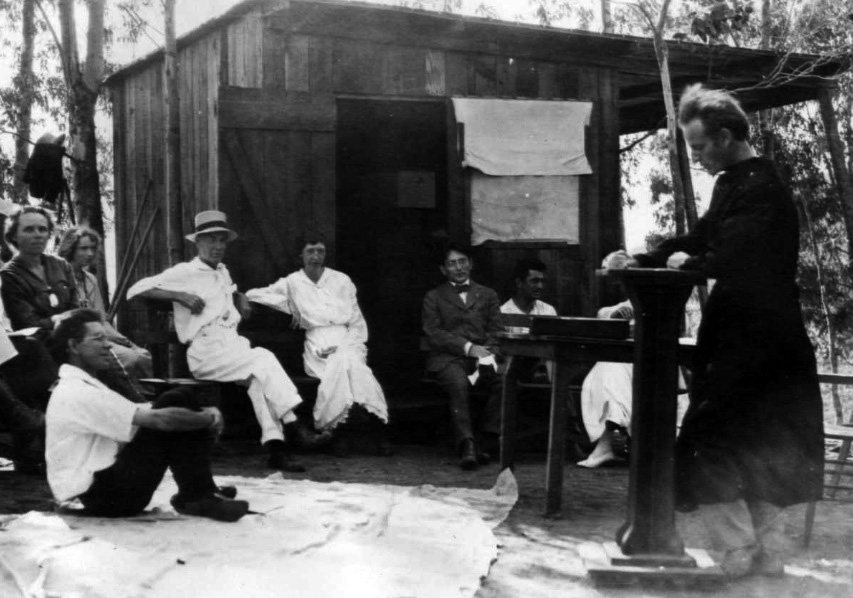
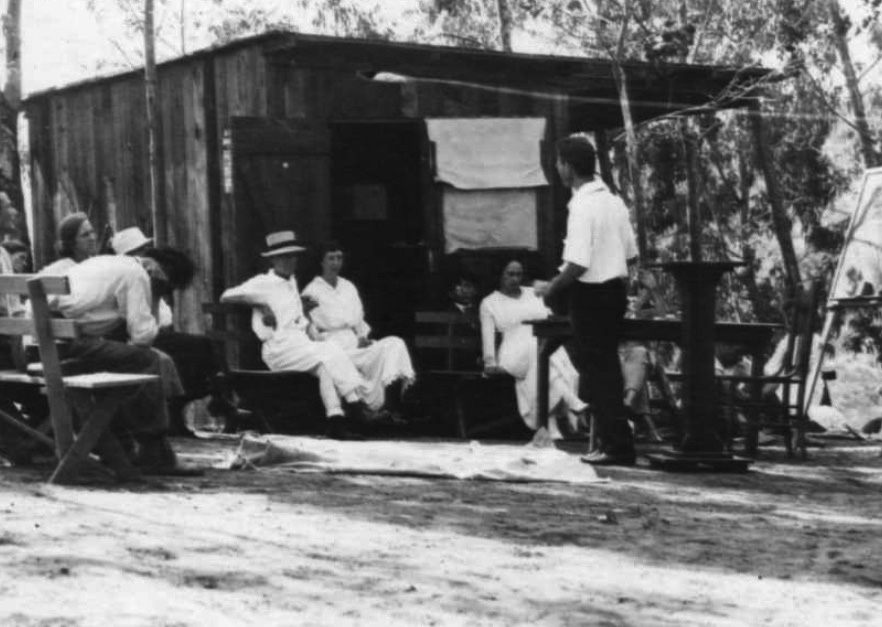
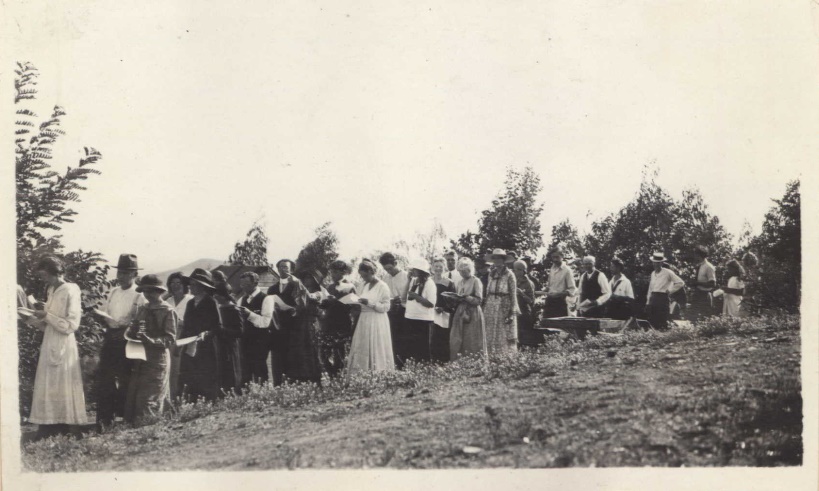

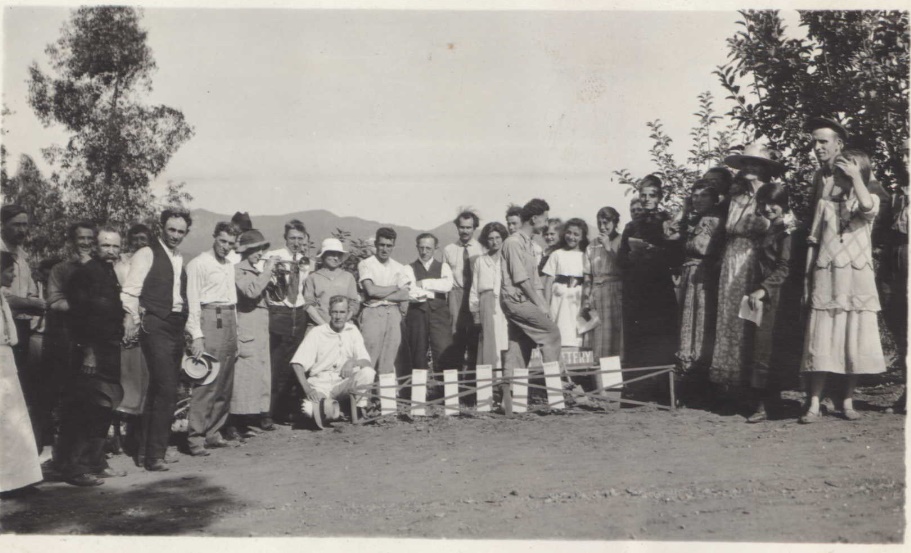
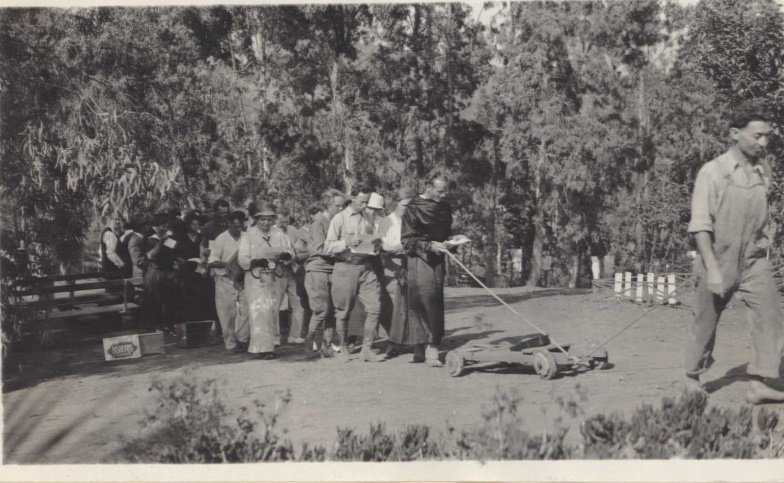
We now turn to Freedom Hill Henry's son
HARPER BEACH HENRY (1895 - ?)
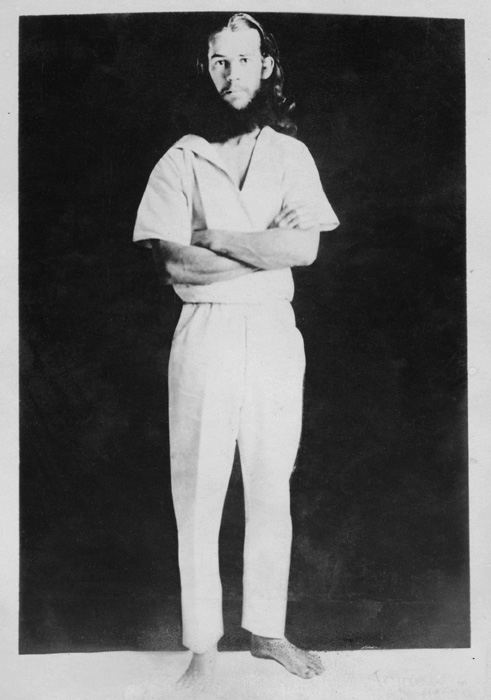
Harper B. Henry
Inventor and Originator of the Azonic Language and Alphabet
by Katherine Albert
When Harper B. Henry invented a new breakfast food and wanted a picture to adorn the front of the box he did not hire an artist to paint for him. Instead he read a book on the principles of art and proceeded to paint the picture himself. He has done that sort of thing all his life. So when he found his scientific activities hampered by the limitiations of our present-day language he decided to create his own.
There is nothing commonplace about Harper Henry, whom you may have seen about town in his picturesque garb. He lives on top of a hill nor far from Roscoe. His long flowing hair and dark curly beard; his bare feet and loose fitting white clothes proclaim the fanatic. But closer acquaintenanceship proves that he is far from the fanatical. He travels in a conveyance which resembles nothing so much as a pink zeppelin on wheels. Yet he does not dress in this unconventional fashion nor choose his car for any other than scientific reasons.
Born Different
Henry was born different from other people. His was an inquiring mind. He wanted to know "why." He did not go toschool because he felt that schools did not teah principles. They only taught children to memorize. It was fundamentals that Harper Henry sought. The fact that a thing was so did not interest him so much as why it was so. In the course of his investigations he discovered the discrepancies of modern language. He wrote down a few philosophic thoughts. In reading over what he had written he found that many of the things he had said might be interpreted in two or more ways. He looked up the meanings of words in the dictionary and found that you could take your choice between lists of definitions. Henry wanted to be specific. Hence he invented a language of his own which he calls "Azonic." This language will admit of no quibbling with words. It is a language of ideas.
New Process
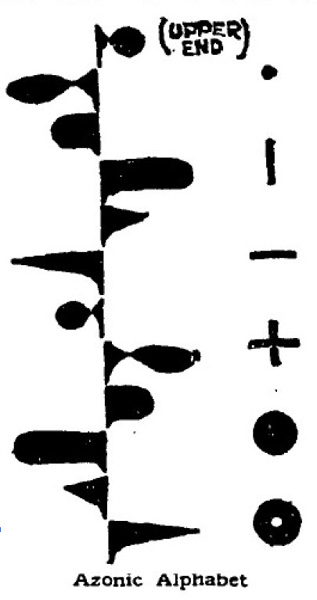 "Fundamentally," said Henry, "the Azonic language is mathematical and scientific. It is not a mere improvement on a modern language, but a new process of conveying ideas by written characters or symbols. All present languages are emotional in their nature. That is, each person has a different idea or concept of the meaning of words, this concept being colored by his own experiences. For instance, what exists is; yet the materialist and the occultist each give existence a different label. Different cults and isms do not differ in fundamentals or ideas. They differ only in terminology. Azonic will make such a difference impossible. Its symbols describe definite ideas independent of action.
"Fundamentally," said Henry, "the Azonic language is mathematical and scientific. It is not a mere improvement on a modern language, but a new process of conveying ideas by written characters or symbols. All present languages are emotional in their nature. That is, each person has a different idea or concept of the meaning of words, this concept being colored by his own experiences. For instance, what exists is; yet the materialist and the occultist each give existence a different label. Different cults and isms do not differ in fundamentals or ideas. They differ only in terminology. Azonic will make such a difference impossible. Its symbols describe definite ideas independent of action.
"There are twelve characters or letters and six symbols of punctuation. The line of writing is from the top to the bottom of the page and subsequent lines from left to right. Each character is made with a single movement away from and back to the line of writing. Printed, the characters are solid face.
"I have taken twelve as my unit of numerals instad of ten. Twelve is a multiple of one, two, three, four and six, wheras ten is a multiple of only one, two and five. Written straight up and down the characters represent the alphabet, when written lengthwise they are the numbers.
Given Definitions
"Having chosen twelve, I shall give the twelve characters definitions covering twelve fundamental principles of nature. With these twelve basic ideas all things and all actions can be described. When writing in broad terms small combinations of characters will be required and larger combinations when writing in careful detail, for all things are described in this order with the broadest classification first and the finest detail last.
Now try reading it all over again and see if you can make anything out of it. On second thought, go on with the story and lets get some more dope on his thing. The inventor's first character he calls "unit substance," the second he calls "unit force" and go on down the line. Number nine represents the molecule. In writing about a sheet of paper, for instance, you call it "a plane of dead vegetable matter." A facetious friend remarks here that a garbage can run over by a truck could be described in the same manner.
Azonic, being the language of ideas rather than of emotions, is pre-eminently suited to philosophical writing. It is simpler, shorter, and less involved, but in writing of common-place things it becomes lengthier. A baby of 5 years of age may be translated as "a 5 year old man" or "a baby of 5." In one sense Azonic is a picture language. Instead of seeing words before you, you see ideas. It is as if the artist were to draw a picture. Everyone could describe the picture in different words. So with Azonic.
May use own language
"in speaking of the Azonic language," said the bearded philosopher, "each person may use his native tongue. All people may wrire it, for its characters are inscribed in the same way in all languages, French, German, Chinese, English, Polynesian. It also has a tongue of its own, in which each character has a complete sound, and is read as a succession of sounds in much the same way as a telephone number is read.
"All time is measured in terms of a day. The date is written as so many days from the founding of the Azonic language. Five Azonic figures will represent the days for more than 700 years and six Azonic figures will represent the days for more than 8,000 years. It takes an average of seven figures to write the present date as we now do it.
"I have not completed my language yet. I am working at it constantly. Presently I shall need help from other scientists."
"Why are you doing all this?" I asked in bewilderment. His answer displayed his character. I expected him to give me a long treatise on the way his language would revolutionize the world and be a boon to suffering humanity, etc., etc., in the time-honored manner of the philanthropic inventor.
For amusement
Instead he said, "I am doing it purely for my own amusement! I do it because I want to do it. That is why anything is done. I do not believe in free will as the phrase is customarily used. I think that every one of us is bound by his own desire for happiness or whatever he wants to do. It is the course of least resistance that we all take."
As I mentioned, Harper Henry is not a wild-eyed fanatic. That is the most amazing part about him. His dress is not a pose, but has been adopted because he has found it to be the most comfortable.
He makes no pretention to an exotic origin. He is an American and he admits it. He was born in Chicago. He has no religion other than the religion of nature. He is free from cults and isms. He seeks no converts to his mode of living. He lives almost a harmit existence and yet he is not unwilling to have a certain amount of human contact.
For the most part Henry has worked as an inventor. As he does not go through the average eight-hour grind a day, he has had time to think, to investigate and to develop the principles of science and of life. he reads geometry and chemistry text books as you and I would read a novel.
Science is known
Henry has touched on all branches of science in the course of his years of study. He is now at work on a novel radio. In his small machine shop he utilizes everything that comes to hand. In making a radio he ground up a phonograph record and remolded it as a fitting on the radio. If the record happened to be a Tchaikovsky symphony what would happen when a jazz band came over the air?
The keynote of Henry's life is simplicity. His house sits high on a hill overlooking the San Fernando Valley. Within its unpainted board walls he has invented innumerable ways of saving time and worry. On the whole he follows his own inclinations, working in his machine shop, painting a few pictures, poring over his scientific note books, defining the reasons for existence and conjuring with the eternal fundamentals. As I have said, he is self-educated, yet he does not lack a sense of humor, of a sort. He has a limited interest in the activities of the day and the thoughts of his contemporaries. He chooses to live his own life rather than to conform to modern conventions.
And now have you pictured a man well along in years who has determined to devote the declining days of his life to the study of science? Then you have not been thinking of Harper Henry. While the majority of those of his age have been seeking frivolous amusement, Henry has been getting his thrills through the development of basic principles. He is 24 years of age.
The next we hear about Harper B. Henry is from the 1940's, when Harper made plans for his Utopian society off the coast of Panama.
From the October 22, 1940 Los Angeles Times:
ADAMS AND EVES WANTED FOR EDEN
Carpenter Seeks Settlers for Island Paradise Off COast of Panama
Have you been looking for an island paradise?
A lot of people have, thinks Harper B. Henry, Costa Mesa carpenter, who announced that he's about to establish such a Utopia on Chirote Island, 10 miles off the coast of Panama.
Yesterday, Henry returned to Los Angeles after exploring the 3000 acre island and obtaining an option on the land. He's already sold the idea to five families and plans to start actual occupation on Dec. 1.
Farming community
Henry comes from a long line of paradise-seekers, he declares. He was brought up in camps and experiemental communities all over the United States, Hawaii and Mexico, but for one reason or another all of them failed to provide the promised surcease from worldly care.
"But now I think I've found the ideal place," he explained. "It will be a farming community, growing truck produce for the Canal Zone. Colonists will raise their own food and there is abundant timber for housing and grazing lands for animals. If we can get honest, independent people we cannot fail."
Moral code
Colonists will have to subscribe to a moral code which Henry has set down, which includes honesty and unselfishness, tolerance and good humor, beyond which the colony will have no religious nature, he states.
Some things weill be community owned, but the residents will agree to respect the property rights of others.
And to add to all the inducements of nature, Henry promises to name a lake or landmark after every resident and declare his or her birthday a community holiday.
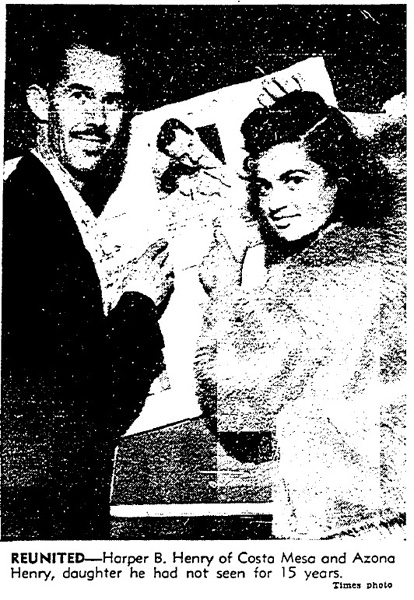 Here's a curious article about Harper and his daughter Azona (remember the Azonic language?) from the November 5, 1940 Los Angeles Times:
Here's a curious article about Harper and his daughter Azona (remember the Azonic language?) from the November 5, 1940 Los Angeles Times:
Father and Daughter Brought Together After 15 Years
Article in 'The Times' About His Projected Island Utopia Off Panama Leads to Reunion
Harper B. Henry, Costa Mesa carpenter, was looking for colonists to populate an island paradise.
And Azona Henry, 19 year-old U.C.L.A. co-ed, was looking for her father, whom she hadn't seen for 15 years.
Yesterday it seemed both had found what they wanted.
Smiling happily, arm in arm, they walked into The Times editorial offices to announce their reunion had been effected though an article published Oct 22 about Henry's plans to start a Utopian colony on Chirote Island, off the west coast of Panama.
Henry and Azona's mother were divorced in Los Angeles in 1925, with custody of the 4 year-old child going to the wife.
Henry went to find a paradise. He sought it in other parts of the United States and in Mexico and Hawaii. In the course of his wanderings he lost track of his family.
But Azona often wondered about her father. When she read her copy of The Times that morning she recognized his picture instantly. She drove to Costa Mesa.
When the door of her father's home opened there burst from her lips the pent-up eloquence of her generation: "Hi-ya pop? Do you know me?"
He did.
From the November 14, 1947 Schenectady Gazette:
Group to Begin Life Anew on Tiny Island
San Pedro, Calif, Nov 13 (UP) - A hardy band of 18 colonists today were sailing to an island 20 miles off the coast of Panama to begin life anew, away from high prices and the problems of civilization.
The party left yesterday aboard the 65-foot former coast guard tug Aster, now registered as a Pan-American coastal vessel.
Heading the group and sponsor of the colonization project is Harper Henry of Los Angeles. Henry owns the island of Chirote and also is owner of the Aster.
Aboard the little ship were nine adults and nine children. They took with them farm machinery, a piano, seeds, beehives, chickens and other equipment.
Henry said the group hoped to raise its own food and planned to start a small broom-making industry on the island which they expected would earn them enough money for outside supplies.
From an unknown news source (presumably 1947):
LOS ANGELES, Nov. 12 (AP) - A dozen farmers, and the wives of five of them, departed today for a Pacific jungle island intent on starting lives anew. Described by their leader as "thoroughly discouraged trying to live here in the face of high prices and the housing shortage," they embarked aboard the 74-foot tug Aster for Chirote, off the province of Chiriqui, Panama. In charge of Harper Henry of Los Angeles, who recently purchased the island, the intrepid voyagers hope to reach their destination in about three weeks, build homes, sow crops, and make brooms from a tropical grass that grows abundantly in that area. "This is an experimental undertaking," Henry told newsmen as the tug was pushed off." "These people fully intend to stay on Chirote permanently, but after three months, if they aren't satisfied, they can return. That's the bargain I made with them." Henry said all understood that it Is to be a rigorous life and that everybody is going to have to work hard, "But that's what these people want to do."
From another unknown news account (also presumably from 1947):
SEVENTEEN SET SAIL FOR LIFE ON ISLAND LOS ANGELES, Nov. 13. (AP). - A 74-foot tug chugged through Pacific waters today bearing seventeen agricultural adventurers to a new life on a jungle island where there are no housing shortages or high prices. The vessel, named the Aster, is a sturdy, diesel-engined former Coast Guard buoy tender owned by Harper Henry of Los Angeles, who also owns the island of Chirote, off the province of Chiriqui, Panama. The expedition expects to reach the island in about three weeks. Henry didn’t give newsmen a roster of the dozen farmers and wives of five of them but said they were friends of his from various parts of the nation who were “thoroughly discouraged trying to live here in the face of high prices and the housing shortage.” The Aster flew the Panamanian flag as it cast off yesterday. Aboard were household goods, beehives, equipment for making brooms from tropical grass and a piano. The colonists expect to live a rugged life, clearing land, planting crops, and cutting timber to get lumber for dwellings. They hope to obtain some revenue by marketing the brooms they make.
It appears that Harper B. Henry's dreams of a long term Utopian society were not to be. We don't have the details as to why his colony failed, but there's this:
Desert Sun, Number 104, 14 February 1956 - TERRY RAY, president of the Palm Springs Real Estate Board, received an unusual listing the other day. It was a listing of the Chirote Island in the Republic of Panama which consists of 4,000 acres of land. It is 12 miles from David Island where the United States Installations are located. In addition to being ideal for cattle raising, the coconut trees on the island net $4,000 annually. The temperature is from 75 to 85 as one-fourth of the land is hilly, going up to 500 feet high. There is good water and some natural jungles. The owner wants $35,000 for this tropical island.
Here our information on the Henry family ends.
Update, 12/7/16:
We have some genealogical data on the Henry Family...
1920 Census: Leroy Henry, age 59, sanitarium doctor, born in Indiana, head of household, Wheatford St. Burbank, Hansen Heights, Los Angeles, CA. (This is not Freedom Hill, apparently.)
Harper B. Henry, age 24, born in Illinois, student.
A 54 year old woman named Frances Jesky is shown as living on the premises.
1930 Census: Leroy Henry, age 69, medical physician, born in Indiana, head of household, 10190 Helen Ave., Los Angeles, CA.
Harper B. Henry, age 24, born in Illinois, student.
Frances Jesky, age 64, is shown as a boarder who is also a printing bookbinder. (Those tracts!)
Here is a map showing 10190 Helen Ave.. You will notice that there is no house there now, and that Google puts this address at the base of what we surmise is "Freedom Hill." Mike and I walked up the path that is shown on the Google satellite image, but found no signs of a house atop the hill. (Video.)
Azona Gilbert Henry (Harper B. Henry's daughter, mentioned above) is in the "U.S., Social Security Applications and Claims Index, 1936-2007":
Name: Azona Gilbert Henry, [Azona Henry Ross], [Peetie Ross], [Peetie Swafford], [Azona Ross]
SSN: 549207922
Gender: Female
Race: White
Birth Date: 17 Aug 1921
Birth Place: Los Angeles, California
Death Date: 10 Dec 2005
Father: Harper Henry
Mother: Ida Gilbert
Type of Claim: Original SSN.
Notes: Aug 1939: Name listed as AZONA GILBERT HENRY; Aug 1944: Name listed as AZONA HENRY ROSS; Oct 1962: Name listed as PEETIE HENRY ROSS; Mar 1969: Name listed as PEETIE HENRY SWAFFORD; 09 Jul 1987: Name listed as AZONA PEETIE H ROSS; 15 Dec 2005: Name listed as AZONA P ROSS.
Azona Henry in the 1940 United States Federal Census:
Name: Azona Henry
Age: 18
Estimated birth year: abt 1922
Gender: Female
Race: White
Birthplace: California
Marital Status: Single
Relation to Head of House: Daughter
Home in 1940: Santa Monica, Los Angeles, California
Street: Third Street
House Number: 2441
Inferred Residence in 1935: Hollywood, Los Angeles, California
Residence in 1935: Hollywood, Los Angeles, California
Resident on farm in 1935: No
Sheet Number: 10A
Occupation: Floral Nursery
Attended School or College: Yes
Highest Grade Completed: High School, 4th year
Duration of Unemployment: 35
A note: Mike and I visited the Helen Dr. site on 12/2/16 to find Freedom Hill, or any remains thereof. A resident told us that about eight months ago a lady who claimed that she was a member of the Henry family stopped by to tell her of the history associated with the place. If you are that lady please contact us! We'd like to talk with you!
4/18/23
There is account of the artist Fremont Ellis meeting Harper Henry and visiting Freedom Hill in the 1920s. This is an excerpt of Fremont F. Ellis - Last of Los Cinco Pintores of Santa Fe by Barbara Spencer Foster:
Even in Los Angeles, times were lean for the young artist. While he continued to paint on a daily basis, he still had trouble finding a market for his work. Deeply depressed one day Ellis left his studio for a walk downtown. He had decided to quit painting-forever when he unexpectedly ran into his father who had been looking for him. "I just sent a model up to your place for you to paint," he told his son. Fremont replied in a despondent voice, "A model. What did you do that for? If it was Jesus Christ himself, I wouldn't paint him." "Well," laughed his father, "You'd better turn around and go back there because this man is as close to Jesus Christ as you'll ever get."
Upon returning to his studio, Ellis was introduced to Harper Henry, a kindly, barefoot, bearded man dressed in white from head to toe. He was a Renaissance man, possessing many talents as an engineer, designer, mechanic and promoter, all in one strange looking package. He was fascinated by Fremont's creativity and style of painting, especially his treatment of light. The two of them immediately found a kindred spirit in each other and touched on many subjects, not only art. Thus began a long and remarkable friendship between Fremont Ellis and Harper Henry, and their young wives.
The world owes a debt of gratitude to Harper Henry, for he was a welcome relief for Fremont and a much needed tonic for this to period in his creative life. Inspired by Henry's enthusiasm and entrepreneurial spirit, he decided to continue painting.
Henry was a wizard at mechanical things and could build almost anything. Inspired by his friendship, with Fremont, he conceived the idea for a vehicle they would call The Ford of Art. It was designed as a customized self-contained unit on a Ford Model-T chassis. It would have seats as well as sleeping quarters for them and their wives. it would also have its own water supply and other comforts. Once built, all four planned to hop into the vehicle and journey to the south rim of the Grand Canyon.
To accomplish this dream Henry invited the young Ellises to move to a little house on his father's place in the San Fernando Valley called Freedom Hill. There they would build The Ford of Art while Fremont would also concentrate on his painting.
Freedom Hill was an isolated piece of land Henry's father had purchased as a place where people "could be themselves." On his first day there, Fremont headed for the workshop to help Henry with the car. He soon encountered other residents who, he noticed, were wearing no clothes and seemed totally unconcerned about the fact. Now he knew why the place was named Freedom Hill. It was a nudist colony.
For several months Henry, with occasional help from Ellis, worked on the car which evolved into a unique custom job, years ahead of any manufactured cars of the time. Airplane fabric covered the hardwood frame on the outside; on the inside it was lined with a mahogany veneer. Best of all, Henry designed the interior space to include a miniature gallery for Fremont to display his paintings. Their plan was to sell the art work along the way to defray expenses. To complete the preparations, Henry wrote and printed a promotional brochure about Fremont Ellis and his art to give out to people they'd meet on their journey. In addition, he designed and constructed a special box for Fremont's oil paints. They were now ready to begin their trek to the Grand Canyon.
In the 1920s the road east from Los Angeles to the Grand Canyon was little more than an unpaved path through the desert, dotted occasionally with a sign from the AAA. Henry did the driving, barely averaging fifteen miles per hour. In spite of mechanical breakdowns, and a dearth of water and gasoline Henry solved problems and kept the party in good spirits. He entertained everyone with philosophical discourse on the nutrient value of yogurt to such complex ideas as nuclear theory and the ultimate development of the atomic bomb.
Ellis always admired him as a genius. After nearly a month of long hot days of driving, they arrived at their destination and Ellis put his paintings on display at a hotel on the south rim of the Grand Canyon. They immediately attracted great interest.
At the end of four days, the travelers had made some respectable sales and Fremont, who was generous with money when he had it, suggested they all celebrate and eat a good dinner. They had been living on the health food the Henrys had brought along, but that night they enjoyed steaks and crab and lobster along with desserts. But the next day they were sick from all the rich foods. Fremont remarked, "What a shame. All that money spent just to make ourselves sick.”